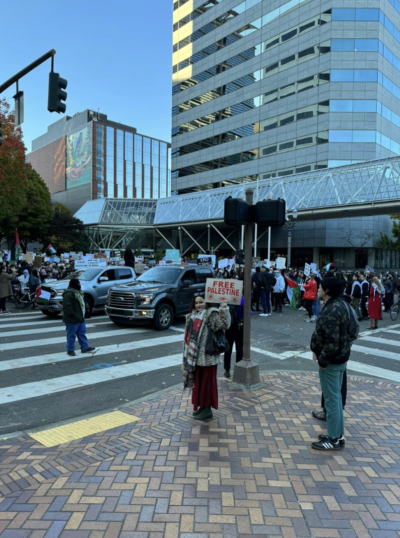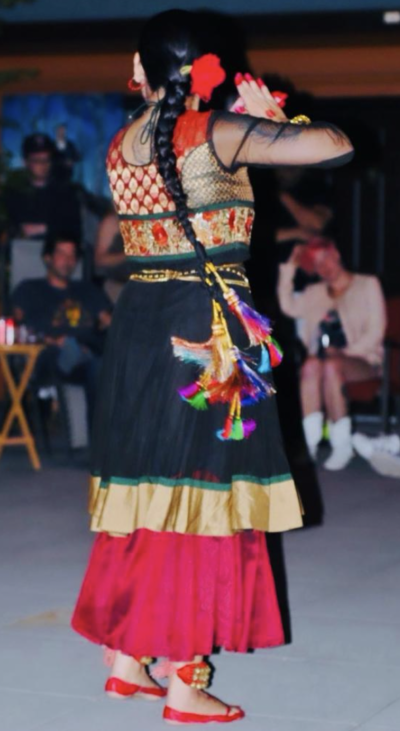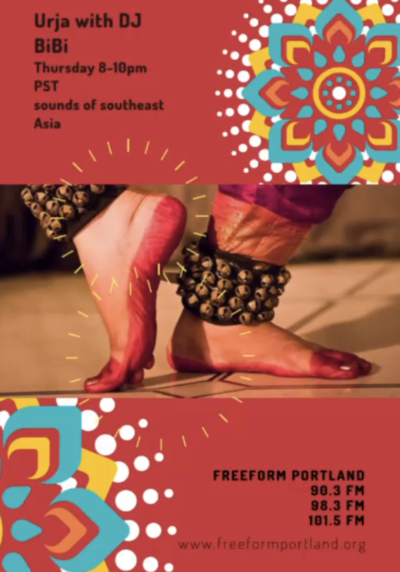Keeping the Keepsakes Alive
December 5, 2023
Text by Simeen Anjum with Simi Malhotra
“So I take it upon myself as a responsibility, as my duty, as an Indian person of origin, that I as an artist need to speak up. I need to raise my voice against the ongoing oppression because my fellow artists, my brothers and sisters back home do not have the privilege and the freedom to do so currently.”
Simi Malhotra
On October 13th, an emotionally charged and energetic protest resonated through the streets of Portland, summoning individuals to stand together and raise their voices against the relentless atrocities and violence inflicted upon the people of Palestine. In my mere month-long stay in Portland, I found myself navigating the intricacies of the city’s public life and culture. As a newcomer to this land, I reveled in the liberating embrace of freedom of speech.
I stood here at my first protest gathering in Portland, a rare occasion in a time when the space for dissent was rapidly diminishing. Shyly clutching a placard, I hesitated to join the impassioned chants, acutely aware of my unfamiliarity with the city and its people.
A voice cut through the energy, calling my name—or so I thought. I turned, and my gaze met another woman, her countenance mirroring my own features. She stood boldly, fearlessly, raising a hand painted banner. It was then that I realized the call was intended for her. She noticed my confusion and introduced herself, saying, “Hi, I am Simi,”. I replied, “We have the same name!” This unfolded my first encounter with Simi Malhotra, a performance artist in Portland, whose roots trace back to New Delhi, much like my own. However, her artistic journey in Portland had started two decades prior to mine, holding a more intimate connection with the city’s public life and culture.
Simeen Anjum: Good Evening Simmi! Long time no see.
Simi Malhotra: Good evening Simmi! Yes. :) (We literally have the same names if pronounced by someone from Delhi)
Simeen: So would you like to begin by introducing yourself for my readers?
Simi: Sure. Hi readers! My name is Simi Malhotra. I was born and raised in Delhi, India, same as Simeen who is here with me, and I moved to Portland 20 years ago when I married my husband who is a native Portlander. Growing up the first art that I learned was Kathak (A classical Indian dance). I practiced Kathak from the age of six to eleven, and then I switched to Odissi and I learned Odissi (a dance-drama genre of performance art, where the artist(s) and musicians play out a story, a spiritual message or devotional poem) . I got trained with the Mahapatra family lineage. My guru’s name was Shri Dilip Shankar Mahapatra. And I learned that and I represented my school, my college, and my university, and my state in many state and national level championships, and I won a few also. In addition to that, I write poetry. I also sing— Sufi, Classical, harmoniums, and vocals. I also do Madhubani paintings.
Simeen: Wow! I am very curious about your poetry. Do you write in English?
Simi: I write in Hindi, Punjabi and Urdu, a mix of the three languages. I am interested in delving deeper into understanding the complexity of human emotions.

Simeen: Can you share an emotion that you’ve been engaged with in your work recently?
Simi: Yes, you see we’ve grown accustomed to encountering news about deaths through cold numbers and statistics, yet each number represents a unique world, an entire universe of individual experiences. Lately, I’ve been experiencing this realization more often. When we look at stuff happening in the world, it’s easy to say something like “so many people died,” or “so many got hurt.” But for those folks, and their families and friends, those are their whole worlds. It just makes you think about how life is both temporary and permanent at the same time. And how something we might see as no big deal can be the most important thing in the world to someone else.
Simeen: Absolutely, I completely get what you’re saying. It’s like we’re bombarded with news about death and violence all the time, and it can make us a bit desensitized. We see these numbers and figures, and it’s hard to really grieve or truly empathize with the people behind them. It’s kind of sad when you think about it.
It reminds me of something Susan Sontag wrote in her work Regarding the Pain of Others, “Compassion is an unstable emotion. It needs to be translated into action, or it withers.” It’s a powerful reminder that just being aware of the pain and suffering around us isn’t enough; we need to take meaningful action to make a difference and truly feel empathy.
Simi: Right.
Simeen: I am also interested in the fact that you have been doing all these various traditional forms of Indian art. Can you describe the transition you went through when you relocated to Portland and started practicing these art forms in a completely different environment? How did this experience contribute to your connection with the local community here?
Simi: I have mixed feelings about all of this, you know. When I started doing this here, I experienced two different kinds of reactions. On one hand, there were folks who were incredibly appreciative and welcoming. They embraced me with open arms, and there was so much warmth, love, and friendship in their approach. That was one side of it. On the other hand, there were also some folks who were pretty ignorant about it all. They either took it humorously and ironically or made fun of it, even going as far as appropriating it.
As an artist, though, this mix of reactions really pushed me to grow. You can’t evolve as an artist without both the positive and negative feedback from your audience. So, it turned into a kind of a constructive challenge for me. The people who were warm and welcoming helped me expand my circle of friends and acquaintances. But with those who didn’t get it, I saw it as a personal mission to educate them in a gentle way, without belittling or demeaning them. It was all about sharing my culture, my roots, my traditions. I knew that if I lost patience or reacted the same way they did, then there wouldn’t be any difference between us. So, it became an opportunity to grow as an artist, whether by gracefully accepting praise or by gently educating others about our culture in a constructive and informative manner.

Simeen: I can see that you’ve really created a wonderful place for yourself here with the work you’ve been doing. Do you think it would be any easier for someone like me, who’s recently moved to Portland, to draw inspiration from your journey? Or do you think I would likely face similar challenges to what you encountered many years ago when you first arrived? I’m curious about what you think has changed over the years in terms of inclusivity and how people of color like us are carving out their space in Portland.
Simi: Well, since I moved here, there have been some changes, but there are still areas that require significant work, and I’ve been actively involved in that ongoing effort. It’s not just me; it’s all people of color, especially those from Southeast Asia and the Middle East. Within our cultures, there are various subcultures. For instance, I’m from India, so within the broader Indian subcontinent, there are further subcultures, and I’m a Punjabi.
For you, it might mean you’re part of all those larger identities, and then, instead of Punjabi, you identify as Muslim, right? These subcultures affect how people interact with us and what they think of us. Almost two decades ago, the challenges were different because people weren’t as aware. Thanks to social media, a lot of things have become more common for people to see, and there’s greater understanding.
Furthermore, with movements like Black Lives Matter and the increased emphasis on inclusivity and open dialogues, conversations have opened up between white individuals and people of color, as well as with other minorities. This dialogue has resulted in many improvements in various ways. Of course, there’s still much work to be done, but you’re going to face your own unique set of challenges, depending on the specific art form you want to pursue and build a career in.
The good news is that you’ll have more open dialogues. People will be eager to listen to you, and you’ll be provided with space to share your experiences. When I first arrived, I often had to create that space for myself, and it didn’t always work out. But I couldn’t take it too much to heart because the fight had to continue. So, you’re a bit more fortunate in that people are listening, educating themselves, and making an effort to understand and give space to those from minority backgrounds, allowing them to share their stories with the world.
Simeen: That’s great to hear, and I’m excited about creating my own space as well. Could you share your insights on how practicing these diverse traditional Indian art forms has influenced your path in terms of forming your identity and finding your space in this journey?
Simi: Definitely, these art forms serve as my anchor, keeping me grounded and deeply connected not just to the broader world, but especially to my community, culture, and roots. When you have a job, a family, and the demands of daily life, it’s all too easy to either forget or use the excuse of not having enough time for things that are inherently and culturally very, very important to you.
These art forms help me stay in touch with and preserve our traditions and cultures, whether it’s participating in festivals or establishing community partnerships that celebrate rising above differences in origin, beliefs, and backgrounds. For instance, they enable me to celebrate Eid with my Pakistani friends, and they, in turn, celebrate Diwali with me. Art forms are what initially connected us, and they continue to strengthen these bonds. And, it’s worth noting that Bollywood also plays a significant role in this connection.
Simeen: How do you feel when you read the news about your homeland and see how things are rapidly changing? And that you might not have the same kind of freedom for intercultural/interreligious dialogue there among different communities?
Simi: I feel that no matter which art form I dive into here, whether it’s performing or fine arts, I always make it a point to share it with the world that they cannot stop everybody from speaking up or prevent artists from speaking up or expressing themselves through their art, despite all the censorship and surveillance that might be going on there. I know things are difficult back home with increasing attacks on minorities and press freedom and activists. However, the fact that we’re living abroad and not directly in the midst of it grants us a unique kind of privilege. We’re beyond the reach of those who might want to silence us. This, in turn, places a significant responsibility on our shoulders. It means we can take action without worrying about what the consequences are going to be. So I take it upon myself as a responsibility, as my duty, as an Indian person of origin, that I as an artist need to speak up. I need to raise my voice against the ongoing oppression because my fellow artists, my brothers and sisters back home do not have the privilege and the freedom to do so currently.
Simeen: I am so glad I met you here, you know. I feel really comfortable just knowing that you are around.
Simi: You know, I used to celebrate all the Indian festivals outside, but now I see them as a unique opportunity for community building, especially for those who are away from home. I love to host gatherings where we can come together, feel a sense of security, and revel in our culture. I’m actually in the process of organizing a Diwali party, and I’d love to have you there. The aim is to foster camaraderie and strengthen our community bonds. However, it’s quite a challenge because we’re all leading busy lives, often dealing with our own share of ups and downs.
I was wondering if there might be someone who shares a similar mindset and perhaps has a bit of flexibility in their schedule. Teaming up with such a person could allow us to plan something special together.
Simeen: Definitely! I am excited. Can you share with us what you have been up to these days?
Simi: Right now, I’m in the process of writing. Mostly I’m journaling, which is kind of free flow narrative because of what’s happening, because I just don’t want whatever feelings that I’m having to just go in a vacuum, get lost in space. So that is why I’m trying to write those down in whatever form they come. I’m not trying to be too hard on myself for it to take the form of a story or an essay or a poem, but I’m just trying to let the words flow out of it. And when all of this is over, I can look back, relate and work on making a form out of them. Right now, I need to just feel.
In addition to that, I am in the process of designing a tote bag collection. I am working with canvas tote bags with hand painted Madhubani motifs. I also just finished a documentary with my friends called The World of Henna, which I helped them shoot in India. I have just finished doing the voiceover for that. Those are the three current things that I’m working on.

Simeen: All right, that sounds great. So I spotted you the other day at a protest demanding a ceasefire on the ongoing violence in Palestinians. Where else can I find you in Portland?
Simi: You can see me at most of the protests for human rights that will be taking place anywhere! I perform at various places in Portland, I do poetry and dance.
But other than that you can spot me at any of the diaspora congregations, whether that’s the Diwali Bazaar or if there’s an Eid or Diwali Bazaar,I would be there. And you can spot me at Bollywood nights at places around the city because I am Punjabi and I love dancing. I work at the Portland Center for the Arts. So all of the five big theaters in downtown Portland; The Keller, Schnitz, Winnix, Newmark, and Brunish. I work as a house manager at those five theaters. So you can see me at one of the performances that are happening over there. One of them coming up is Chelsea Handler and then Zakir Hussain is playing later this month. And other than that, I work at the community convention center.
I also run my radio show in Portland, serving the Indian diaspora and the broader South Asian community. I curate different playlists that resonate with our cultural experiences. I mostly play folk music of the southeast region of Asia and try to create a sense of unity, building a community where individuals from diverse backgrounds can connect through the soulful melodies of South Asian music.
Simeen: Thank you Simi, for giving me your time for this interview. Here’s my last question, If you could have anything from anywhere in the world for dinner tonight, what would it be?
Simi: Oh my God! Here’s two things. Khatta Meetha Pethe ki Sabzi with Bedmi, the Bharmapuri with the Khatta Meetha Petha, with the big achar from Mathura or Vrindavan.
Simeen: I haven’t had it, but I love how it sounds.
Simi: And the second one is the Amritsari Kulcha bread with nothing but just, like, a big dollop of white butter on it. The one with potato stuffing. And a big big big glass of lassi.
Simeen: Perhaps we can attempt cooking it ourselves sometime if we get together.
Simi: For sure.
Simeen Anjum (she/her) is a social practice artist and cultural activist from New Delhi, India. Locating herself in the disquiet of state suppression, surveillance, personal and collective trauma, she attempts to document,cherish and archive the smallest fragments of ordinary life. Through her work, she hopes to provide alternatives to established socio-political narratives. She works in direct interaction with her community and surroundings.
Simi Malhotra (she/her), a native of Delhi, India, has been a dynamic presence in Portland for the past two decades. Rooted in classical Indian dance, Simi transitioned from Kathak to Odissi, representing her school, college, and state in numerous championships. Alongside her dance prowess, Simi is a poet, singer of Sufi and classical genres, and a skilled performer.She also practices Madhubani, a style of Indian folk painting. Currently serving as the House Manager at the Portland Center for the Arts, she’s a multidisciplinary artist with a deep commitment to her art and social activism.


